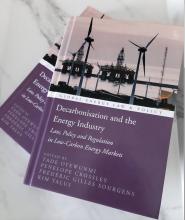January 26, 2021

Dr. Tade Oyewunmi is a Vermont Law School assistant professor and senior research fellow in energy law and policy. His teaching and research focuses on policies and regulation of natural gas and electricity markets, international energy and resources law, decarbonization and energy transitions, energy justice, and regulation of network-based industries.

Recently Dr. Tade Oyewunmi gave us some insight into his newest book project, Decarbonisation and the Energy Industry: The Role of Law and Regulation in Low-Carbon and Transitional Energy Markets, which was released in November of 2020.
In the past century, modern economies developed with the help of carbon-intensive energy sources like oil, gas, and coal. But the looming threat of climate change now makes it imperative for economies to pivot to more sustainable, decarbonized types of energy. As a result, the energy industry—both globally and in the United States—is undergoing a significant transformation. Comprising 16 chapters and contributions, Oyewunmi’s book focuses on the legal and regulatory dimensions of that transformation, both in highly industrialized major economies and in resource-rich developing nations.
“More innovative carbon-neutral or low- to zero-carbon energy technologies—such as utility-scale, wind and solar, hydrogen, smart and mini-grids, and energy storage solutions—are emerging and becoming very competitive, depending on the context,” Oyewunmi said. “As the various decarbonization and transitional trends unfold, it’s also important to underscore the pivotal role law, policy, and relevant institutions play in addressing the tradeoffs and issues that arise.”
“More innovative carbon-neutral or low- to zero-carbon energy technologies . . . are emerging and becoming very competitive, depending on the context”
–Professor Tade Oyewunmi
Oyewunmi and his co-editors—Penelope Crossley, Frederic Gilles Sourgens, Kim Talus, and other contributors—address a range of energy decarbonization issues throughout the book’s 16 chapters. And the VLS professor hopes readers will leave with a few key takeaways.
First, he wants to convey the importance of understanding the trade-offs and the costs and benefits of the various pathways for energy transformation and decarbonization. He also hopes equity and fairness implications will be factored into the process, especially when it comes to setting a price for carbon emissions. He wants readers to understand the regulatory and policy instruments (such as feed-in tariffs or premiums, renewable portfolio standards for utilities, tradeable green certificate schemes, net metering, tax rebates, and capital grants) that can ease the upfront costs for the development and installation of renewable energy projects. “It’s also essential to implement a pragmatic process and framework for integrating such new technologies and projects with existing networks or energy markets,” Oyewunmi said.
Finally, Oyewunmi hopes the book will encourage the adoption of more affordable, reliable, and sustainable access to energy in developing countries. “Although the transition to low-carbon energy and the economic system presents considerable challenges for developing countries,” he said, “it also presents unique opportunities in ensuring a sustainable path towards industrialization and economic growth.”